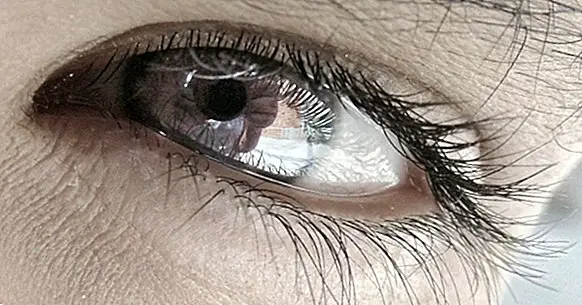Arbitrary inference: characteristics of this cognitive bias
Each of us has its own way of seeing the world, of explaining ourselves and the reality that surrounds us. We observe and receive the data of the environment through our senses, to later give them a meaning, interpret them and react to them.
But in the interpretation come into play a lot of mental processes: we use our mental schemes, our beliefs, our knowledge and previous experiences to give them a sense. And sometimes, our interpretation is biased and distorted for some reason. One of the biases that we usually apply in our day to day is the arbitrary inference .
- Related article: "Cognitive biases: discovering an interesting psychological effect"
Cognitive biases
The arbitrary inference is one of the different biases or cognitive distortions, which are understood as that type of error in which the subject interprets reality in a wrong way as a result of beliefs derived from experiences or processing patterns learned throughout life .
For example, cognitive distortions are what cause prejudice and stereotypes to exist, or misinterpret the intentions of others towards us or that only consider one or two possible solutions to the same problem instead of thinking about intermediate or different solutions.
The individual generates an explanation of the world or of himself based on false premises , which may cause him to make various interpretive errors and which may have consequences in his way of acting. Among these biases we can find selective abstraction, dichotomous thinking, personalization, overgeneralization, minimization or maximization or arbitrary inference.
- Maybe you're interested: "The 10 types of logical and argumentative fallacies"
The arbitrary inference
When we speak of arbitrary inference we are talking about the type of cognitive distortion in which the subject reaches a certain conclusion about an event without there being data to support this conclusion or even in the presence of information contrary to it.
The person in question does not use the available evidence, but quickly jumps to interpret the situation in a certain way, often due to their own expectations, beliefs or previous experiences.
For example, we think that someone wants to harm us and discredit us because he has disagreed with our opinion, that we will suspend an exam regardless of what we study, that a person wants to sleep with us because he smiled at us or that a specific number is more or less chances of winning the lottery than another because that number coincides with the day of a birthday or anniversary.
Arbitrary inference is a very common mistake in most people, and serves as a cognitive shortcut that allows us to save energy and time to process information in more detail. Sometimes it is even possible that we reach a correct conclusion, but it would not have been drawn from the information available.
Influence on mental disorders
Arbitrary inference is a type of cognitive distortion that we all can commit and commit from time to time. However, its habitual appearance can bias our behavior and our way of interpreting reality .
Along with the rest of cognitive distortions, the arbitrary inference appears as a distortion that participates in generating and maintaining maladaptive thought patterns in multiple mental disorders.
1. Depression
From the cognitive-behavioral perspective, specifically from the cognitive theory of Beck, it is considered that the cognitive alterations of depressive patients are generated by the activation of negative and dysfunctional thinking schemes, these thoughts being due to cognitive distortions such as arbitrary inference.
These distortions in turn cause the problem to be maintained because they hinder alternative interpretations. For example, a patient may think that he is useless and that he will not get anywhere even though there is information pointing to the opposite.
2. Psychotic disorders
One of the most well-known symptoms of psychotic disorders is the existence of hallucinations and delusions . Although the latter can be more or less systematized, the fact is that different aspects that could contradict the subject's belief are not taken into account and it is common for an intention or fact to be inferred arbitrarily from another that does not have to have any bonding For example, the idea that they are persecuting us can start from the observation of a subject who is nervous on the street.
- Maybe you're interested: "The 12 most curious and striking types of delusions"
3.Disorders linked to anxiety and phobias
Anxiety is another problem linked to cognitive distortions such as arbitrary inference. In anxiety panic emerges in anticipation of possible harm , prejudice or situation that may or may not occur in the future.
As with anxiety, in phobias there is a stimulus, group of stimuli or situations that cause us panic. This panic can come from the belief that if we approach that stimulus we will suffer damage. For example, arbitrarily inferring that if a dog approaches it will bite me.
4. Personality disorders
Personality is the relatively stable and consistent pattern of ways of thinking, interpreting and acting before ourselves and the world. In many personality disorders, such as the paranoid, there are biased interpretations of reality which may be due to processes such as arbitrary inference.
Solution through therapies?
Although arbitrary inference is not a disorder, in cases where it appears in a context of psychopathology in which the problem is created or maintained, it is necessary to reduce or eliminate the bias that this cognitive distortion causes.
Cognitive restructuring is often used for this purpose as a method by which the patient fights thoughts derived from arbitrary inference and other distortions and learns not to make such distortions. It is about helping to find alternatives equally valid to one's own, to discuss what causes such thoughts or what they are based on, to search and contrast the available information.
Bibliographic references:
- Beck, A. (1976). Cognitive Therapy and the emotional disorders. International University Press. New York
- Santos, J.L. ; García, L.I. ; Calderón, M.A. ; Sanz, L.J .; de los Ríos, P .; Left, S .; Román, P .; Hernangómez, L .; Navas, E .; Thief, A and Álvarez-Cienfuegos, L. (2012). Clinical psychology. CEDE Preparation Manual PIR, 02. CEDE. Madrid.
- Yurita, C.L. and DiTomasso, R.A. (2004). Cognitive Distortions. In A. Freeman, S.H. Felgoise, A.M. Nezu, C.M. Nezu, M.A. Reinecke (Eds.), Encyclopedia of Cognitive Behavior Therapy. 117-121. Springer



















